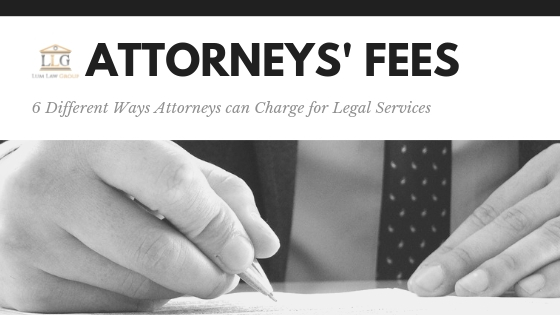6 Different Ways Attorneys Charge for Their Legal Services
Hiring a legal professional can be intimidating for the average person. Maybe you’re starting a business and realizing you need some advice. Or you have questions about trademarks or intellectual property in general. Perhaps you’ve been asked to sponsor someone for an employment visa. For whatever reason you’re considering hiring an attorney, a central question on your mind is: “How much is the lawyer going to charge me?” In this article, we break down a couple of the different ways attorneys can charge for their services so that you can be better informed prior to your initial appointment with an attorney.
1. Attorneys Can Charge Hourly
Much like a wage employee, most attorneys will charge for their services on an hourly basis. The hourly cost for an attorney can range anywhere from $100 an hour to the thousands.
When you see advertisements for a “free consultation” with an attorney, it’s important to also ask what their normal hourly rate. Don’t be lured in by the promise of “free” and then be charged for everything else later.
Keep in mind attorneys will usually have a separate rate for Paralegal work. Unless it’s a solo attorney law office with no employees, attorneys often delegate work to paralegals and legal assistants. The hourly rate for a Paralegal is set by the attorney, so you should ask how much they will charge you for it, but is often significantly lower than the attorney’s hourly rate.
Inside Tip: Always ask an attorney for an estimate of how much time/money they believe your case will require. Many entrepreneurs and small business owners are surprised by how affordable attorney services can be compared to non-attorney services, such as online services or “preparation” services.
2. Attorneys Request Retainers
When an attorney charges by the hour, they will often request a retainer, or deposit, to ensure they’re paid for their services. You’ll know the minimum amount the attorney estimates your case will cost from the retainer amount. This does not mean the cost cannot exceed the retainer, but it does give you a ballpark idea.
Inside Tip: You can try requesting a “cap”, or maximum amount you’re willing to spend, when negotiating your retainer agreement with the attorney.
3. Attorneys Charge for Costs
An attorney’s hourly rate does not include costs, fees, or external services, unless specifically mentioned. This is important if you’re hiring an attorney for work that involves filing fees, messenger services, background checks, or multiple hearings. Attorneys may charge for printing fees, binding fees, folders, postage, mileage, parking, and filing fees. Many law offices will bill these individually, allowing them to add up at the end. Some law firms charge a flat rate for costs. Few lawyers don’t charge for most office costs, only external costs, such as filing-, court service-, and messenger fees. Others will request a separate retainer to cover their costs.
Inside Tip: Since you might not be aware of all the costs your attorney will incur in the process of your case, ask your attorney to list out all costs and an estimated total on the retainer, or fee agreement.
4. Attorneys Can Offer a Flat Rate
It is common for attorneys to offer a “flat rate” cost structure. We’ve seen it most in intellectual property registration, such as trademark registration, and immigration. The reason is that it usually involves preparing and filing a form, preparing necessary evidence, and responding to issues as they arise. In the examples of trademark registration and immigration application, the attorney is heavily involved in the beginning, and then only needs to monitor the case after submission. This means the attorney is not continuously involved in your case, unlike with litigation, mediation, or patent prosecution cases.
Attorneys may also offer a flat rate fee if you’re very specific in your needs. For example, you only need the attorney to review a contract. Or you need an attorney to draft a non-disclosure agreement according to your specific situation. In these cases, an attorney can estimate the amount of time it will take him to complete the task after obtaining enough details.
Insider Tip: If you are budget conscious, ask the attorney for a flat rate but offer to keep the attorney on speed dial for your next legal hire.
5. Attorneys Can Charge Monthly or Annually
Just as large corporations have in-house corporate counsels working for them, small business owners can contract an attorney as their “go-to-legal-counsel”. A long-term arrangement will usually have a set time period for which the attorney will charge either a monthly or yearly rate. The attorney will set parameters for what they are able to help you with during this time period, for example legal advice, drafting letters, drawing up contracts, or reviewing legal documents. Similarly, the contract attorney may also set limits by excluding high-cost and time-consuming matters requiring litigation, or outside referrals for matters that are outside of his expertise.
Insider Tip: Hire an attorney for a short contract first to see how you work together before keeping them on long-term!
6. Attorneys Can Start For Free
When the attorney says “you don’t pay unless we win”, it means that the attorney will not charge for legal services until your case has been resolved and you’ve received a settlement (money). This is called payment on a “contingency-basis”, wherein the law firm will work for free until you receive compensation. Personal injury, worker’s compensation, malpractice, and employment attorneys commonly use the contingency payment model. The attorney will take a percentage of your settlement, ranging from thirty to eighty percent. For example, if you were to “win” a settlement of one million dollars, and your fee agreement states your attorney takes sixty percent, then your attorney will give you a check for four hundred thousand dollars.
If you do not win your case, then in most cases you will not owe the attorney anything. Be sure to carefully read your fee agreement to see for what fees and costs, if any, you’ll be responsible.
Insider Tip: To determine whether it is worthwhile for you to pursue your case, ask the attorney for an estimate of how much cash you’ll receive from the settlement. This is especially important if it’s a class-action law suit, or any settlement where you’ll have to divide your portion with others.
While attorney fees can seem high, keep in mind that many attorneys are open to negotiation. What you see on an ad, or hear on the phone, may not be the only method, fee, or cost. Always read the fine print of your fee agreement or retainer before signing it, and don’t be afraid to ask questions if you have any.
Did you find our explanation of fee structures and payment methods clear? Find out how Attorney Lum would charge for your case!


